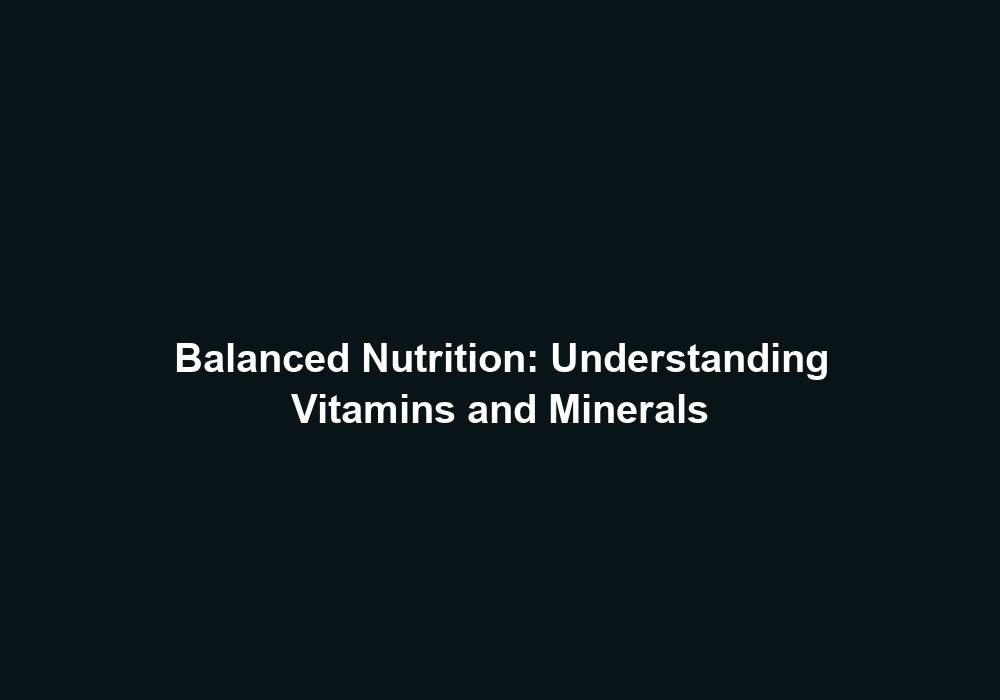Balanced Nutrition: Understanding Vitamins and Minerals
Nutrition plays a crucial role in maintaining optimal health and well-being. When it comes to achieving a balanced diet, it is important to understand the significance of vitamins and minerals. These essential nutrients are required in small quantities but have a profound impact on our overall health. In this article, we will delve into the world of vitamins and minerals, exploring their functions, sources, and the importance of incorporating them into our daily diet.
The Importance of Balanced Nutrition
A well-balanced diet provides our bodies with the necessary nutrients, energy, and building blocks it needs to function optimally. It not only fuels our bodies but also helps prevent nutrient deficiencies and promotes overall health. Balanced nutrition is essential for:
-
Energy: A balanced diet provides the energy our bodies need to perform daily activities, support metabolism, and maintain body temperature.
-
Nutrient Intake: Consuming a variety of foods ensures that we get a wide range of essential nutrients, including vitamins and minerals, which are necessary for growth, development, and maintaining bodily functions.
-
Weight Management: A balanced diet helps maintain a healthy weight by providing the right balance of macronutrients (carbohydrates, proteins, and fats) and controlling calorie intake.
-
Disease Prevention: Proper nutrition plays a crucial role in preventing chronic diseases such as heart disease, diabetes, and certain types of cancer. A diet rich in fruits, vegetables, whole grains, lean proteins, and healthy fats can help reduce the risk of these diseases.
Understanding Vitamins
Vitamins are organic compounds that are required in small amounts to support various biological functions in the body. They can be categorized into two groups: fat-soluble vitamins and water-soluble vitamins.
Fat-Soluble Vitamins
-
Vitamin A: This vitamin is crucial for maintaining healthy vision, promoting proper immune function, and supporting the growth and development of cells and tissues. It also plays a role in reproduction and fetal development. Good sources of vitamin A include carrots, sweet potatoes, spinach, and liver.
-
Vitamin D: Known as the sunshine vitamin, it plays a vital role in calcium absorption, bone health, and immune system function. It also helps regulate cell growth and plays a role in reducing inflammation. Exposure to sunlight and consuming foods like fatty fish, fortified dairy products, and egg yolks can help ensure adequate vitamin D levels.
-
Vitamin E: With its antioxidant properties, vitamin E protects cells from damage caused by free radicals. It also supports healthy skin, enhances immune function, and aids in red blood cell production. Nuts, seeds, spinach, and sunflower oil are excellent sources of vitamin E.
-
Vitamin K: This vitamin is essential for blood clotting, bone metabolism, and heart health. It also plays a role in regulating blood calcium levels. Leafy greens, broccoli, Brussels sprouts, and green tea are rich sources of vitamin K.
Water-Soluble Vitamins
-
B-Complex Vitamins: This group includes several vitamins such as B1 (thiamine), B2 (riboflavin), B3 (niacin), B6 (pyridoxine), B12 (cobalamin), and folic acid. B-complex vitamins are involved in energy metabolism, brain function, and red blood cell production. They also help support a healthy nervous system and promote healthy skin, hair, and eyes. Whole grains, legumes, meat, eggs, and leafy greens are excellent sources of these vitamins.
-
Vitamin C: This powerful antioxidant supports the immune system, promotes collagen synthesis for healthy skin, aids in iron absorption, and protects against oxidative stress. It also plays a role in wound healing and supports the health of bones, teeth, and blood vessels. Citrus fruits, berries, kiwi, bell peppers, and leafy greens are abundant in vitamin C.
Importance of Minerals
Minerals are essential nutrients that our bodies require in small amounts to carry out various physiological functions. They can be categorized into two groups: macrominerals and trace minerals.
Macrominerals
-
Calcium: This mineral is crucial for maintaining strong bones and teeth, supporting muscle function, nerve transmission, and proper blood clotting. It also plays a role in hormone secretion and cell signaling. Dairy products, leafy greens, tofu, and almonds are excellent sources of calcium.
-
Magnesium: Involved in over 300 enzymatic reactions, magnesium plays a vital role in energy production, muscle and nerve function, and regulating blood pressure. It also helps maintain a healthy immune system and supports bone health. Nuts, seeds, legumes, whole grains, and leafy greens are rich sources of magnesium.
-
Potassium: This mineral helps maintain fluid balance, supports muscle contractions, and aids in nerve function. It also plays a role in regulating blood pressure and promoting heart health. Bananas, avocados, potatoes, spinach, and beans are good sources of potassium.
Trace Minerals
-
Iron: Essential for the production of hemoglobin, iron plays a crucial role in oxygen transport throughout the body. It also supports cognitive function, immune health, and energy metabolism. Red meat, poultry, seafood, legumes, and fortified cereals are excellent sources of iron.
-
Zinc: This mineral is involved in numerous enzymatic reactions, supports immune function, wound healing, and DNA synthesis. It also plays a role in cell division and growth. Meat, legumes, whole grains, and nuts are good sources of zinc.
-
Iodine: Required for the production of thyroid hormones, iodine contributes to proper thyroid function and metabolism. It is essential for growth and development, especially during pregnancy and infancy. Seafood, dairy products, and iodized salt are rich sources of iodine.
Tips for Achieving Balanced Nutrition
Now that we understand the importance of vitamins and minerals, here are a few tips to help you achieve a well-balanced diet:
-
Incorporate a variety of fruits and vegetables into your meals to ensure an adequate intake of essential vitamins and minerals. Aim for a colorful plate to get a wide range of nutrients.
-
Choose whole grains over refined grains to boost your intake of fiber, B-vitamins, and minerals. Whole grains provide more nutrients and have a lower glycemic index, which helps regulate blood sugar levels.
-
Include lean sources of protein such as poultry, fish, legumes, and tofu in your diet. Protein is essential for muscle growth and repair, immune function, and hormone production.
-
Limit processed foods and sugary beverages that provide empty calories and lack essential nutrients. Opt for whole, unprocessed foods whenever possible.
-
Stay hydrated by drinking plenty of water throughout the day. Water is essential for digestion, nutrient absorption, temperature regulation, and overall well-being.
-
Consider consulting a registered dietitian or nutritionist for personalized dietary recommendations based on your specific needs. They can help create a customized meal plan that meets your nutritional requirements and health goals.
Remember, achieving balanced nutrition is a long-term commitment, and it’s essential to make gradual changes to your eating habits for lasting results. By incorporating a wide variety of nutrient-rich foods into your daily meals, you can ensure that you meet your body’s vitamin and mineral requirements. So, make informed choices, embrace a well-balanced diet, and enjoy the benefits of good nutrition for a healthier and happier life.







